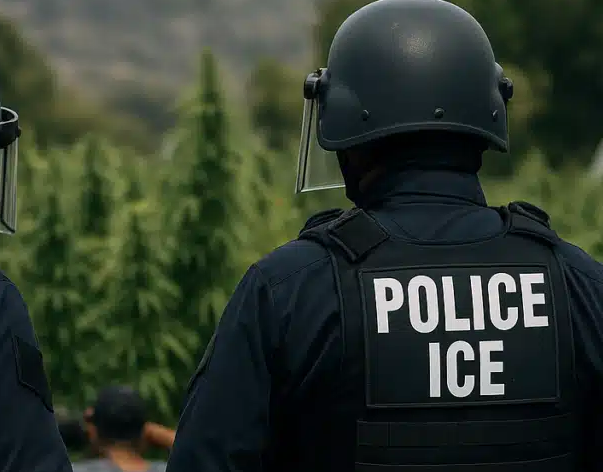Federal agents clashed with protesters in California. Texas courts drew a hard line on hemp. And in Washington, lawmakers made modest progress on long-stalled cannabis legislation. It’s been a wild July for the U.S. cannabis industry—and the headlines kept coming.
U.S. Immigration and Customs Enforcement (ICE) raids in Southern California sparked outrage and confusion, not just over the use of force but the targeting of a legal, licensed cannabis company. Meanwhile, Texas doubled down on its THC restrictions, leaving hemp businesses scrambling. And on Capitol Hill, a few long-awaited federal cannabis bills finally showed signs of life.
ICE Raids Spark Chaos at Legal California Greenhouses
It started like any other morning at Glass House Farms, a major cannabis grower operating legally in California’s Santa Barbara and Ventura counties. But by midday, it had turned into a scene straight out of a war zone.
Two separate cultivation sites—Carpinteria and Camarillo—were surrounded by ICE officers in tactical gear. Protesters quickly gathered, and things escalated fast. According to eyewitnesses and Glass House representatives, agents deployed smoke bombs, flash bangs, and even rubber bullets. No one expected that level of force.
Local authorities were caught off guard too. Santa Barbara County officials said they hadn’t been notified in advance. Glass House Farms, for its part, confirmed its operations are fully licensed and compliant with state law.
One protester, interviewed anonymously, said: “We came to stand up for our workers, and they treated us like criminals. It was chaos.”
The reasons behind the raids remain murky. ICE hasn’t publicly explained why it targeted Glass House. However, speculation has centred on the immigration status of certain workers at the site—despite the employer’s insistence that all hiring was legal and documented.
The raids reignited debates about the disconnect between federal immigration enforcement and state-legal cannabis industries. California lawmakers are now demanding answers.

Texas Ban on Hemp-Derived THC Leaves Businesses in Legal Limbo
If California’s issue was boots on the ground, Texas’ was a gavel in the courtroom. On July 1, a judge in Travis County upheld the state’s controversial ban on hemp-derived THC products—including delta-8 and delta-9 variants that have exploded in popularity nationwide.
It’s a major blow for Texas hemp companies, many of whom built their business models around the sale of low-THC but still psychoactive products. The legal fight isn’t over, but for now, enforcement is expected to resume.
One business owner in Austin, who asked to remain unnamed, said the ruling “basically wipes out 70% of our revenue overnight.”
Here’s what the ban includes:
-
All delta-8, delta-9, and other synthetic or semi-synthetic THC products derived from hemp
-
Products containing more than 0.3% THC by dry weight, regardless of format (gummies, vapes, oils, etc.)
The decision contradicts federal policy, which under the 2018 Farm Bill, legalised hemp and its derivatives. But state regulators have insisted that anything psychoactive—even if hemp-derived—is off-limits.
Legal experts say the decision may set the stage for a Supreme Court challenge. For now, though, retailers are being warned to clear their shelves or face fines and potential criminal penalties.
Federal Cannabis Reform Bills Move… Slowly
While chaos brewed at the state level, Congress was inching ahead—at a snail’s pace.
Three key cannabis bills saw movement in July:
-
The SAFER Banking Act, which aims to give cannabis businesses access to banking services, cleared another Senate committee.
-
The HOPE Act, a bipartisan bill that would fund state-level expungement programs, got reintroduced.
-
The CLIMB Act, which would open up capital markets for cannabis companies, gained new sponsors.
But let’s not sugar-coat it. Progress remains painfully slow. None of these bills are guaranteed to pass this session. The SAFE Banking Act, in particular, has been floating around since 2013.
There was one glimmer of hope: Senate Majority Leader Chuck Schumer included cannabis banking in a list of bipartisan priorities for the fall. Whether that translates to action remains to be seen.
For cannabis business owners, the lack of access to traditional financial services remains one of the biggest hurdles. Most are still stuck dealing in cash, a security nightmare and a tax mess.
One cannabis accountant joked: “You haven’t lived until you’ve tried paying payroll with a backpack full of twenties.”
A Tumultuous Summer, and It’s Only Getting Hotter
July wrapped up with more questions than answers. Was Glass House Farms unfairly targeted? Will Texas businesses survive the THC crackdown? Is federal reform ever going to happen?
In the meantime, cannabis operators—big and small—are being forced to adapt, sometimes overnight.
Let’s break down how each headline has left its mark:
| Issue | Impacted States | Key Consequences |
|---|---|---|
| ICE Raids | California | Worker fear, legal battles, trust erosion |
| Hemp THC Ban | Texas | Business shutdowns, product seizures |
| Federal Reform Bills | Nationwide | Continued banking issues, capital limitations |
And while the stories differ wildly, they share one common thread: legal grey areas. Until federal and state policies align—or at least stop contradicting each other—the cannabis industry will remain stuck in limbo.
One industry analyst summed it up like this: “We’re legal enough to be taxed, but not legal enough to be protected. That’s the maddening part.”
Even the data backs it up. A 2024 Pew Research survey found that 73% of Americans support full legalisation of cannabis. Yet federal law remains frozen in time.
This gap between public opinion and policy is what keeps turning relatively small issues into national news stories. And it’s why headlines like these aren’t likely to go away anytime soon.
Maria Garcia is an award-winning author who excels in creating engaging cannabis-centric articles that captivate audiences. Her versatile writing style allows her to cover a wide range of topics within the cannabis space, from advocacy and social justice to product reviews and lifestyle features. Maria’s dedication to promoting education and awareness about cannabis shines through in her thoughtfully curated content that resonates with both seasoned enthusiasts and newcomers alike.








